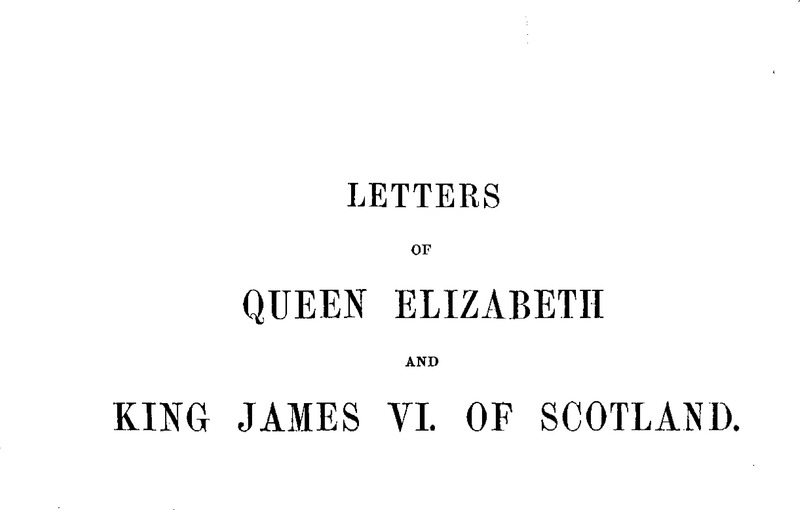Article contents
Letters of Queen Elizabeth and King James VI. of Scotland
Published online by Cambridge University Press: 23 February 2010
Abstract

- Type
- Letters of Elizabeth and James VI
- Information
- Copyright
- Copyright © Royal Historical Society 1849
References
page iv note * Crawford's Peerage of Scot. p. 253.
page v note * “Strange to hear ray lord Lauderdale say himself that he had rather hear a cat mew than the best music in the world ; and the better the music the more sick it makes him; and that of all instruments he hates the lute most, and next to that the bagpipe.” Pepys's Diary, iii. 246.
page xi note * Cotton MS. Titus, C. VII. fo. 123.
* Davison left Edinburgh, on his return to England, on the day following the date of this letter. Bowes Correspondence, p. 397.
* So in the MS. perhaps for duites, in the sense of apt or skilful.
† So in the MS perhaps for qu alors.
‡ So in the MS. perhaps for de tant.
* So in MS. for esteem.
* William Knolles, eldest son of sir Francis Knolles, K.G. who married Katharine, daughter of William Cary esquire, by Mary Boleyne, Elizabeth's maternal aunt. Before the actual invasion of Scotland by the banished lords, sir Edward Wotton had found it necessary to desert his post of ambassador at James's court. James having given orders to seize Wotton in his house and hold him as an hostage for Arran, Wotton mounted a fleet horse, and crossed the borders during the night.
* So in the orig.
* This is the reading of the MS.
* So in the original.
* This alludes to the desired delivery to Elizabeth of Ker of Fernihurst, who was accused of having plotted the death of lord Russell.
* The paper torn.
page 38 note * The discovery of Babington's conspiracy.
page 38 note † Archibald Douglas was at this time the Scottish ambassador at Elizabeth's court.
page 39 note * i. e. Mary queen of Scots.
* So in the orig.
† The Kers of Pernihurst, implicated in the death of lord Russell.
‡ This must not be understood'to mean that they were none of them subjected to torture or menace, but that the confession in question was not made under torture or menace.
* An in the orig.
† Sene in the orig.
* “To prove his sincerity against the catholics, he [James] summoned his forces, attacked the castle of Lochmaben, … and, reinforced by an English battering train, beat the castle about the ears of its captain, whom he hanged, with six of his men.” Tytler's Scotland, ix. 21.
* So in the orig.
* So in the orig. The word which the transcriber mistook was perhaps “layte.”
† Perhaps this ought to be, “quhiche-whairby.”
* Frederick II. of Denmark died 4th April 1588. His ministers, then in the service of his son and successor, and James, during his stay in Denmark, set on foot a proposal for a peace between England and Spain, to which this postscript alludes.
* William Ashby was at this time resident English ambassador in Scotland.
* The earl of Worcester was sent to Edinburgh in June 1590 to invest the Scottish monarch with the order of the garter.
page 65 note * i.e. good turns made to conduce to the harm of the doer.
page 66 note * Westmerland is afterwards termed by Elizabeth “the first traitor that ever my reign had.”
page 87 note * “Mr. David Makgill, the king's advocate, a man of extraordinary talent.” (Tytler's Scotland, ix. 100.)
page 88 note * Sir Robert Melvill, the ambassador before alluded to.
* writ.
† Sir Robert Melvill.
page 95 note * This refers to letter No. LII. “Your most affectionate sister and cousin, ELIZABETH R,” with all that follows, is in the queen's handwriting.
page 95 note † The earls of Huntly, Errol, and Angus.
page 96 note * A rebellious assembly at that spot in April 1589.
page 96 note * James Gordon, a busy Scottish Jesuit.
page 96 note * The queen's answer is printed by Mr. Tytler as follows :—“My dear brother, To see so much, I rue my sight, that views the evident spectacle of a seduced king, abusing council, and wry-guided kingdom. My love to your good and hate of your ruin, breeds my heedful regard of your surest safety. If I neglected you, I could wink at your worst; and yet withstand my enemies' drifts. But be you persuaded by sisters[?]. I will advise you, void of all guile, and will not stick to tell you, that if you tread the path you chuse, I will pray for you, but leave you to your harms.
* Edward lord Zouche of Haryngworth.
* See p. 98.
* For “machinations.”
* Birch's Mem. Eliz. ii. 25, 43, 111.
* Accusation, indictment.
page 122 note * In the sense of “besides.”
page 123 note * This obscure conclusion is printed as it stands in our MS.
* That is, the opposite warden of the Scottish marches.
† Day of truce, in which border complaints were determined by the wardens.
* That is, a third companion, or partner, in that game.
* ? he hath made to him.
* Shake or disquiet, ebranler.
* So in the MS. The sense seems to require “worst.” The word “for” in the latter part of the sentence is probably an interpolation.
* Perhaps a mistake of the transcriber for “spare.”
* League.
* So in the MS. The sense seems to require “claim” or “challenge,” or some
* A blank in the MS.
* So in MS. for machinations.
† i. e. hearing.
* whining.
- 2
- Cited by




